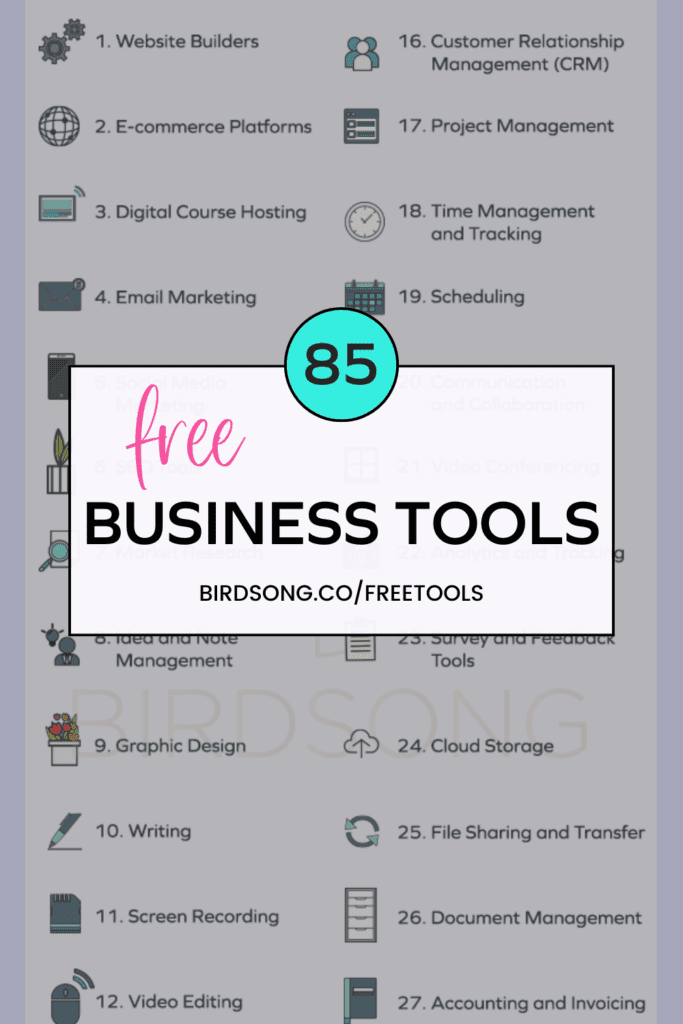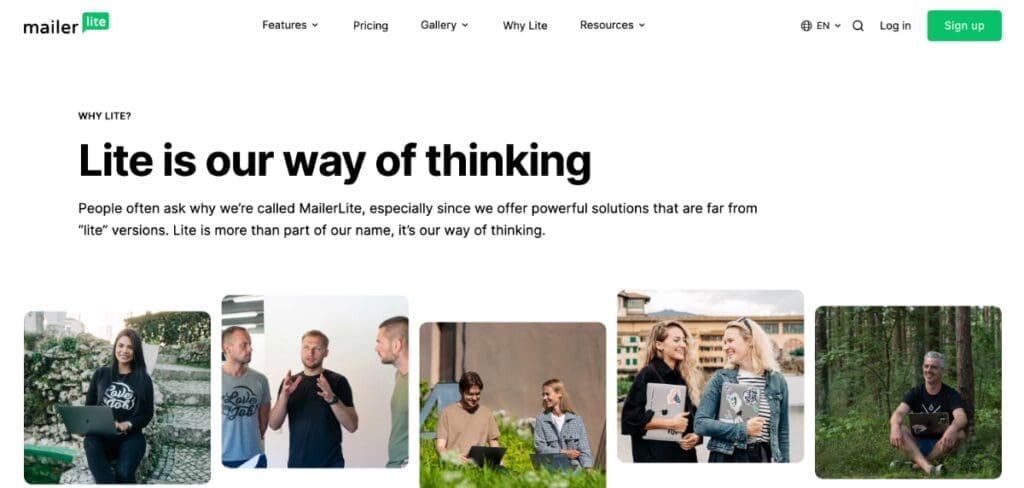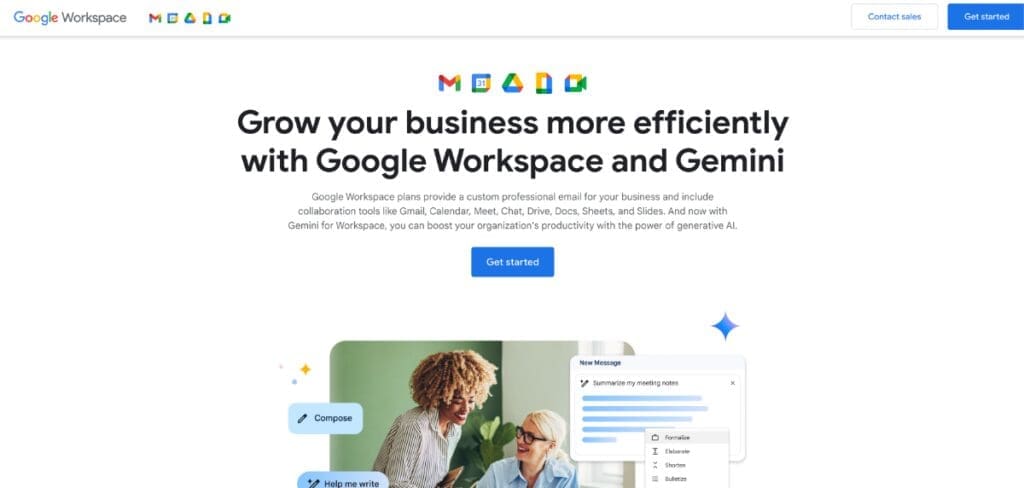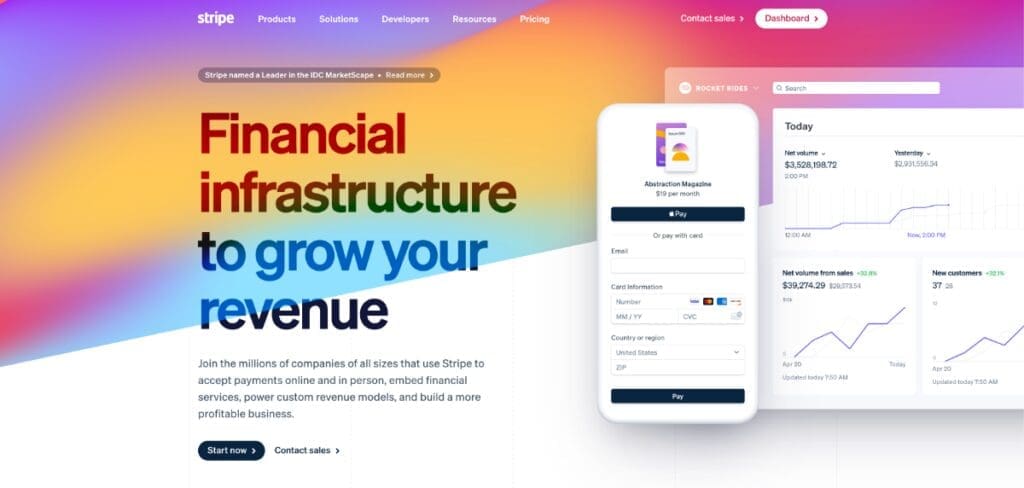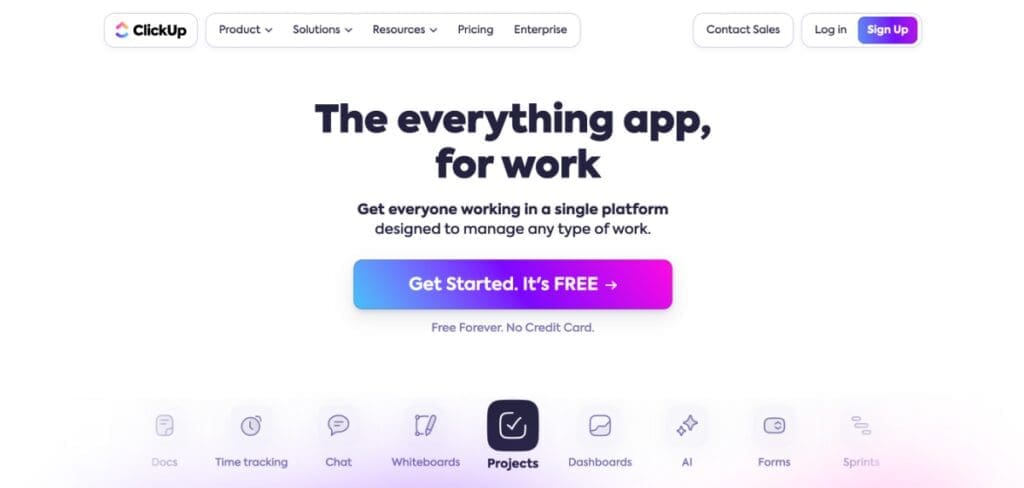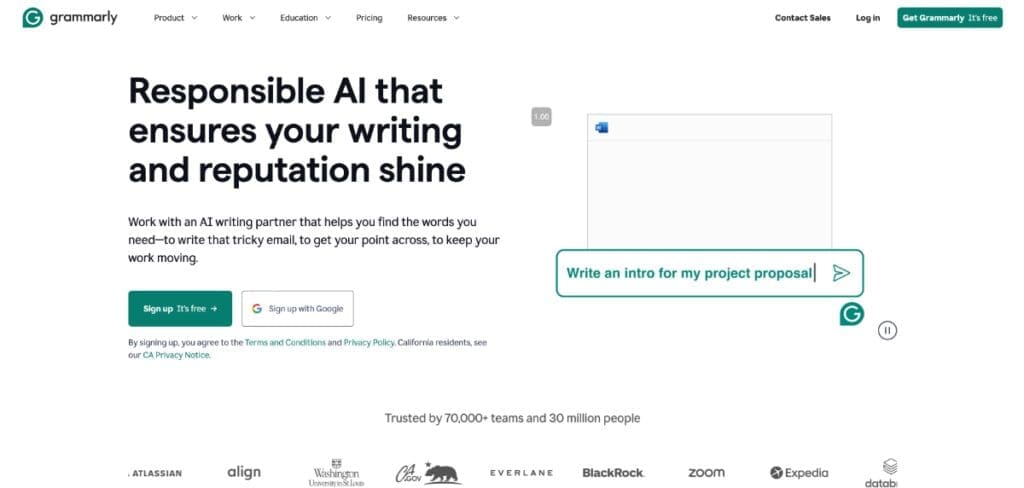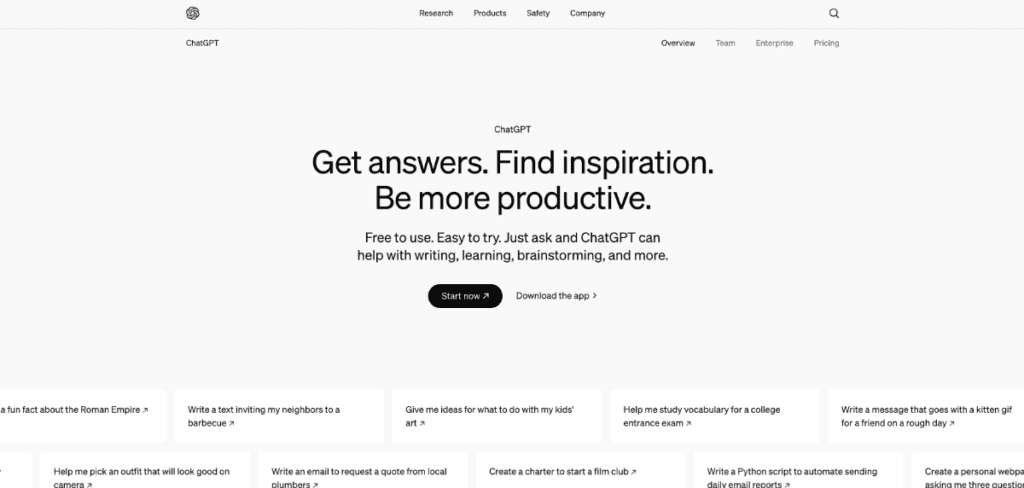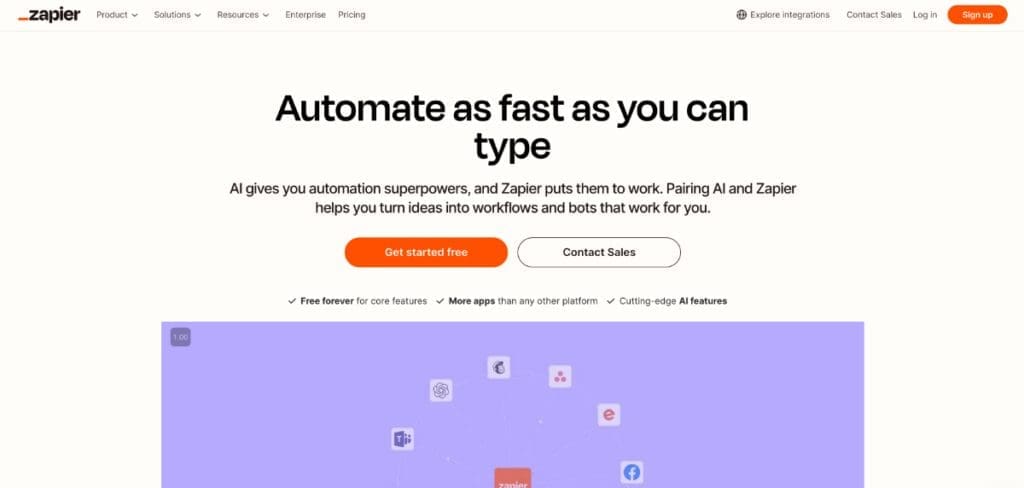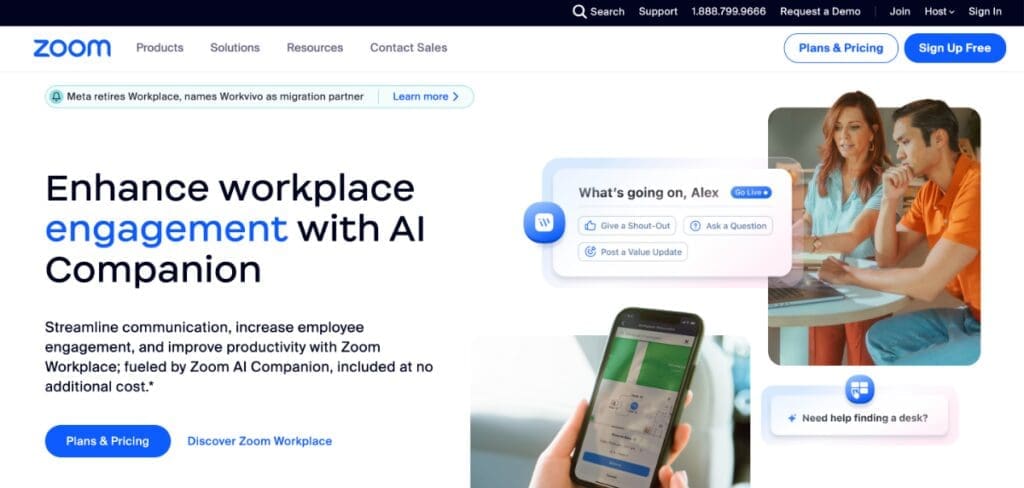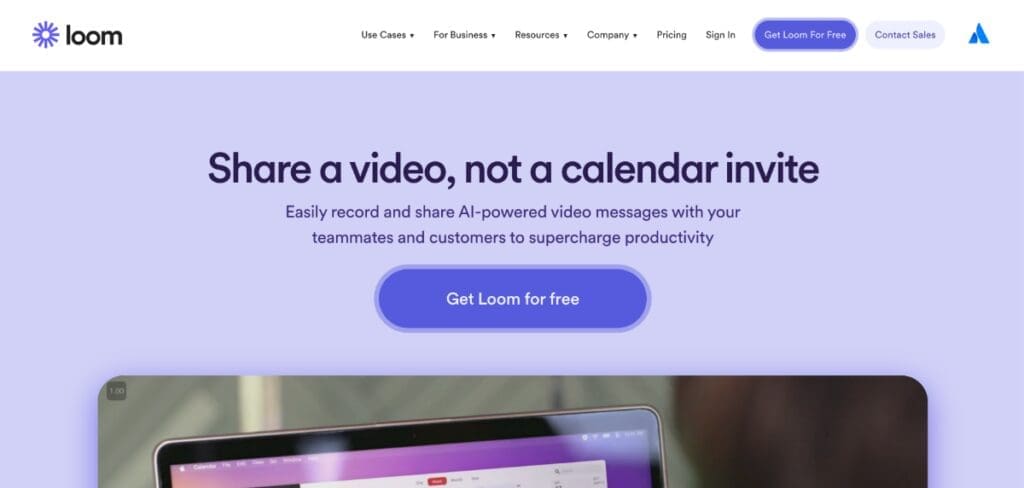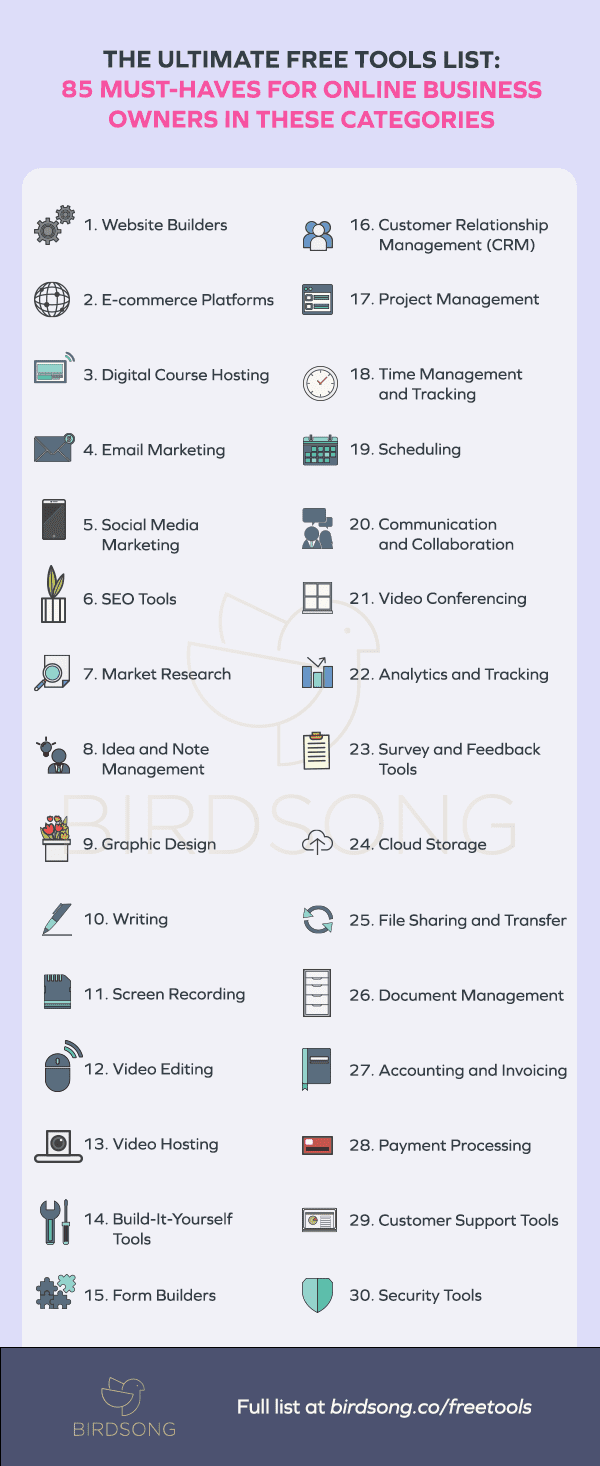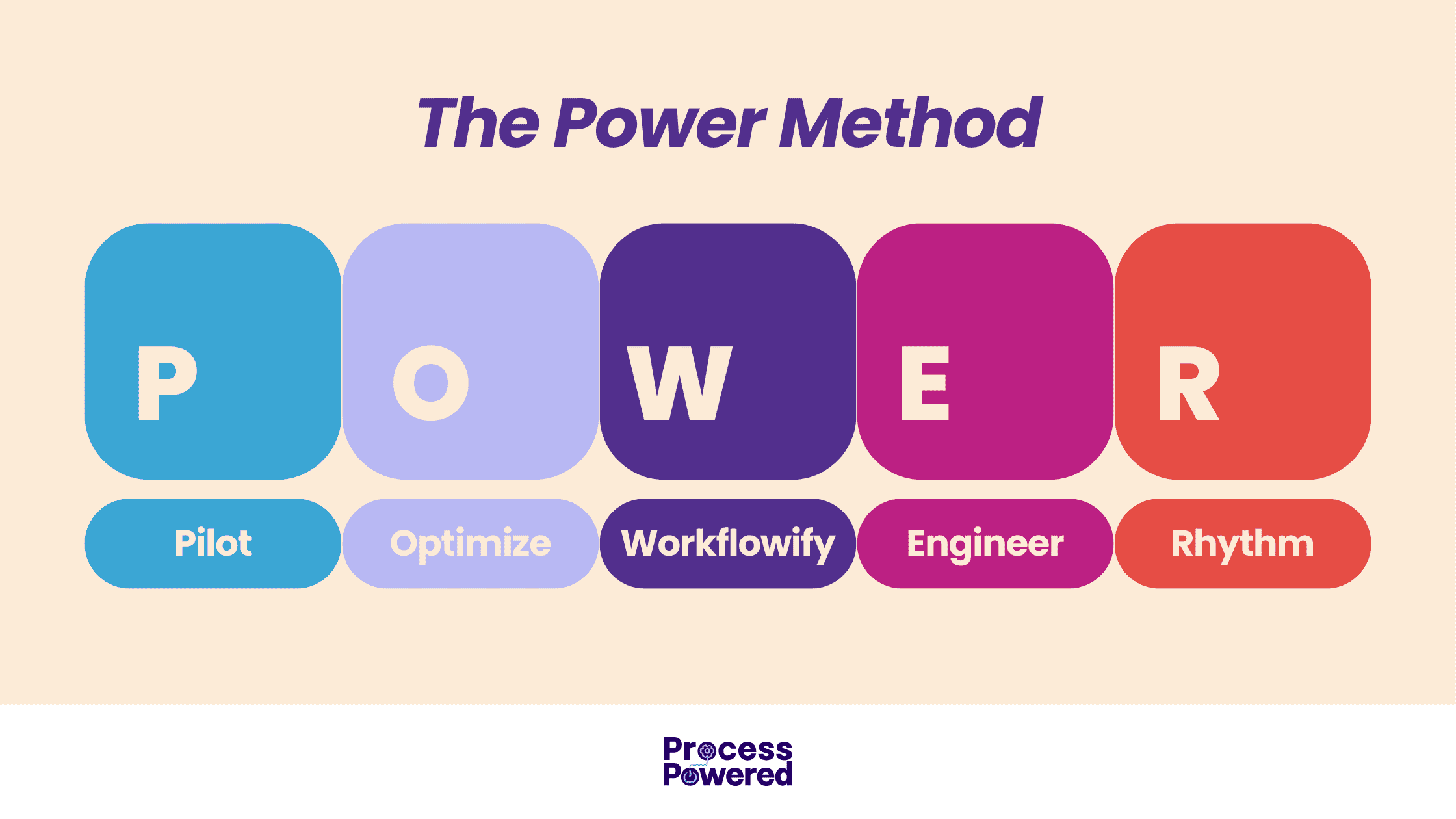Last Updated on January 21, 2026 by Monica Snyder
Starting and growing an online business can feel like a big challenge, especially when you're on a tight budget. But here's the good news: you don't need to spend a fortune to make your business dreams a reality. With the right set of free online business tools, you can streamline your operations, boost productivity, and scale your business effectively.
Fortunately, there are numerous online business tools available for free to help you manage and grow your business efficiently. Using these free tools can significantly contribute to your business growth.
Let’s start with the top-recommended online tool sets, which are really more like Swiss army knives for small businesses.
Top 12 Recommendations for Free Online Business Tools
For small online businesses looking for versatile and multifunctional tools, the following “powerhouse” options stand out for their ability to handle multiple tasks efficiently and provide cost-effective solutions.
These tools save time and integrate seamlessly with other applications, making them indispensable for business operations.
MailerLite
Capabilities: Email Marketing, Marketing Automation, Landing Pages, Website
MailerLite is a comprehensive platform that offers email marketing, marketing automation, website creation, and landing pages on its free plan. Its intuitive interface makes it easy to design email campaigns, automate workflows, and build high-converting landing pages, all within one tool.
Canva
Capabilities: Graphic Design, Video Editing, Content Creation, Website
Canva is an easy to use tool that excels in graphic design, video editing, and content creation. With its user-friendly interface, vast template library, and collaborative features, Canva is perfect for creating visual content such as social media posts, marketing materials, presentations, and even videos.
Google Workspace (formerly G Suite)
Capabilities: Content Creation, Communication and Collaboration, Cloud Storage, Document Management, Time Management and Scheduling
Google Workspace includes tools like Google Docs, Google Sheets, Google Drive, Google Calendar, and Google Meet. This suite covers everything from document creation and cloud storage to communication and collaboration, offering comprehensive cloud-based solutions essential for business operations.
Teachable
Capabilities: Digital Course Hosting, Content Creation, Marketing Tools
Teachable is a robust platform for online entrepreneurs who create and sell online courses. It offers features for course creation, student management, and online learning. With Teachable, you can build engaging courses, create sales pages, and track student progress all in one place.
Stripe
Capabilities: Payment Processing, Invoicing, Subscription Management, Billing
Stripe is a developer-friendly payment processing platform that also handles subscription management and billing. Its powerful APIs and extensive documentation make it easy to integrate into your website or app, and it supports various payment gateways, providing a seamless payment experience for your customers.
ClickUp
Capabilities: Project Management, Task Management, Time Tracking, Collaboration, Document Management, Team Communication Software, Team Management
ClickUp is a comprehensive project management tool that offers task management, time tracking, and collaboration features. Its flexibility allows business owners to easily create tasks, customize workflows, set priorities, and collaborate with your team efficiently, all in one platform. With the proper setup, it can also do Customer Relationship Management (CRM), social media scheduling, and so much more. It also works on desktop and mobile devices.
Grammarly
Capabilities: Writing Assistance, Grammar Checking, Style Suggestions
Grammarly is an essential tool for anyone producing written content. It helps you write error-free content by checking for grammar and spelling mistakes, offering style suggestions, and improving overall readability and content quality. Whether you’re writing emails, blog posts, or social media content, Grammarly ensures your writing is polished and professional.
Google Analytics
Capabilities: Website Analytics, Performance Tracking, Visitor Insights
Google Analytics is a free web analytics service for tracking and analyzing your website’s performance. It provides detailed insights into visitor behavior, traffic sources, and conversion rates. With Google Analytics, you can make data-driven decisions to optimize your website and marketing strategies.
ChatGPT
Capabilities: Customer Support, Content Generation, Virtual Assistance
ChatGPT is an advanced language model that can assist with customer support, generate content and social media posts, and act as a virtual assistant. Whether you need help crafting emails, writing blog posts, or providing 24/7 customer service, ChatGPT can handle a variety of tasks with ease.
Zapier
Capabilities: Workflow Automation, Integration, Task Automation
Zapier is a powerful tool for automating workflows and integrating different apps, services, and online business tools. It allows you to create “Zaps” that connect your favorite apps, automating repetitive tasks and improving efficiency. With Zapier, you can streamline your operations and ensure your small business tools work together seamlessly.
Zoom
Capabilities: Video Conferencing, Webinars, Online Meetings
Zoom is a leading video conferencing tool that offers features for online meetings, webinars, and virtual collaboration. It provides high-quality video and audio, screen sharing, and recording options, making it ideal for remote work and virtual events.
Loom
Capabilities: Screen Recording, Video Messaging, Team Collaboration
Loom is an easy-to-use screen recording tool that allows you to create and share video messages quickly. It’s perfect for tutorials, team updates, and asynchronous communication, providing an efficient way to communicate visually.
The free versions of these powerful tools provide a range of functionalities that can simplify and streamline business operations for small business owners, making them invaluable assets for any digital course creator, service provider, or other online business.
Now, there’s obviously a lot more you’ll need to do in your business. So, here’s a comprehensive list of essential free tools categorized for your convenience, along with descriptions, pros and cons, and links for each.
Ultimate List of 85 Free Tools
This comprehensive list of free tools covers all essential aspects of running a small online business, from website building and e-commerce to marketing, content creation, customer management, and more. With these tools, you can enhance business efficiency and effectively launch and grow your business without breaking the bank.
Website Builders

Building a website from scratch can be intimidating, but these free website builders make it easy for anyone, regardless of technical skill level, to create a professional and attractive site.
WordPress.com: A widely-used platform offering customizable themes and plugins, perfect for building a professional website with minimal effort.
Pros: Highly customizable, vast community support, scalable.
Cons: Free version can have a learning curve and has limited features. You may need an experienced web designer to help.
Webflow: A powerful website builder that allows you to design, build, and launch responsive websites visually, without writing any code.
Pros: Highly customizable, professional design capabilities, integrates with many tools.
Cons: Steep learning curve, some advanced features require paid plans.
Wix: Known for its drag-and-drop interface, Wix offers a variety of templates and design flexibility, making it easy to create a stunning website.
Pros: User-friendly, extensive template library, no coding required.
Cons: Limited customization, can become expensive with premium features.
Weebly: A user-friendly website builder with integrated e-commerce capabilities, ideal for small businesses and startups.
Pros: Easy to use, good e-commerce options, responsive designs.
Cons: Limited customization options, fewer templates compared to competitors.
E-commerce Platforms

Choosing the right e-commerce platform is essential for online sales. These platforms offer robust tools to help you manage products, process payments, and provide a seamless shopping experience for your customers.
WooCommerce: A flexible and customizable e-commerce platform built on WordPress, perfect for creating a professional online store.
Pros: Highly customizable, large community support, integrates with WordPress.
Cons: Requires WordPress, can be complex for beginners.
Big Cartel: Designed for artists and makers, Big Cartel provides a straightforward way to sell products online with a free plan for up to 5 products.
Pros: Simple setup, artist-friendly, no transaction fees.
Cons: Free version is limited to 5 products and basic features.
Square Online: Offers a free e-commerce site with built-in payment processing, allowing you to start selling quickly and easily.
Pros: Easy integration with Square POS, no monthly fees, robust features.
Cons: Transaction fees apply, limited customization.
Ecwid: Allows you to add a free online store to any existing website, providing a seamless e-commerce solution.
Pros: Easy to integrate, supports multiple sites, no setup fees.
Cons: Limited features in the free plan, transaction fees apply.
Gumroad: A platform designed for creators to sell digital products and memberships with ease.
Pros: Simple setup, great for digital products, no monthly fees.
Cons: Transaction fees apply, limited customization options.
Digital Course Hosting

Hosting your digital courses on a reliable platform is crucial for providing a smooth learning experience. These free online course hosting tools offer essential features to help you create and manage your online courses.
Teachable: Offers a free plan with basic features for creating and selling courses, ideal for beginners.
Pros: Easy to use, good for beginners, integrates with other tools.
Cons: Limited features on free plan, transaction fees apply.
FreshLearn: Provides a free plan with unlimited courses and digital products, along with features like video hosting, sales page builder, and a custom domain.
Pros: Unlimited courses, no transaction fees, integrated video hosting.
Cons: Limited to 25 enrollments on the free plan, some advanced features require paid plans.
Udemy: Allows you to create and host courses for free, with revenue sharing on sales.
Pros: Easy to use, large audience, good for reaching students.
Cons: Revenue sharing, limited customization options.
Email Marketing

Email marketing remains one of the most effective ways to reach your audience. These free email marketing tools provide essential features to help you grow your subscriber list, send targeted campaigns, and analyze results.
Mailchimp: Provides a free plan for up to 2,000 subscribers, including basic email marketing features to help you grow your audience.
Pros: User-friendly, good automation tools, comprehensive analytics.
Cons: Limited features in the free plan, can be expensive as you scale.
Sendinblue: Includes 300 emails per day with advanced marketing tools, offering a robust solution for small businesses.
Pros: Unlimited contacts, advanced features like SMS marketing, good automation.
Cons: Daily sending limit on free plan, interface can be complex.
MailerLite: Offers up to 1,000 subscribers and 12,000 emails per month, with features like landing pages and automation.
Pros: Easy to use, landing page builder, affordable premium plans.
Cons: Limited templates, fewer integrations compared to competitors.
Social Media Marketing

Managing multiple social media accounts can be overwhelming, especially for a small business. These free social media management tools help you enhance your social media strategy by scheduling posts, tracking performance, and engaging with your audience across various platforms.
SEO Tools
Buffer: A simple tool to schedule and manage posts across all your social networks, helping you maintain a consistent online presence and solid social media strategy.
Pros: Easy to use, clean interface, basic analytics.
Cons: Limited features in the free plan, no support for some social media platforms.
Meta Business Suite: A free tool for managing your Facebook and Instagram accounts, offering features to create, schedule, and analyze posts.
Pros: Integrated with Facebook and Instagram, comprehensive features, free to use.
Cons: Limited to Facebook and Instagram, can be complex for beginners.
Later: Focuses on Instagram but also supports other social media accounts, with a free level that includes 30 posts per month.
Pros: Visual content calendar, good for Instagram, easy to use.
Cons: Free plan limits posts per month, fewer features for non-Instagram platforms.
ManyChat: A versatile chatbot tool to automate conversations, send broadcast messages, and engage with your audience through interactive chat experiences.
Pros: Easy to use, integrates with Facebook Messenger and Instagram, supports automation.
Cons: Limited features on the free chat plan, some advanced features require paid plans.

Improving your website’s visibility in search engines is essential for attracting organic traffic and enhancing your search engine rankings. These free SEO tools provide valuable insights and recommendations to help you optimize your site and content.
Google Search Console: Provides insights into your website’s performance on Google Search, helping you optimize your site for better visibility.
Pros: Comprehensive data, free to use, integrates with Google Analytics.
Cons: Can be complex for beginners, limited to Google search data.
Ubersuggest: A keyword research tool by Neil Patel that offers SEO analysis and content ideas to improve your search rankings and know what to share with your website visitors.
Pros: Easy to use, good keyword data, useful SEO suggestions.
Cons: Limited daily searches on the free plan, data can be less accurate.
Yoast SEO (for WordPress): A popular plugin that helps you optimize your WordPress site’s on-page SEO.
Pros: Easy to use, comprehensive SEO features, integrates with WordPress.
Cons: Some advanced features require premium version, specific to WordPress.
Market Research

Understanding your market and staying informed about trends is crucial for making strategic business decisions. These free market research tools provide valuable insights into industry trends, consumer behavior, and competitive analysis.
Google Trends: Google Trends allows you to explore trending topics, compare search terms, and analyze interest over time across various regions and categories.
Pros: Easy to use, real-time data, valuable insights into trending topics.
Cons: Limited to Google search data, may require additional tools for comprehensive analysis.
AnswerThePublic: Provides insights into what questions people are asking about various topics, helping you understand consumer concerns and interests.
Pros: Visualizes data, easy to use, generates content ideas.
Cons: Limited searches on the free plan, data can be broad.
Ubersuggest: Offers keyword research, SEO analysis, and content ideas to help you understand market demand and improve your online presence.
Pros: Comprehensive keyword data, useful SEO suggestions, easy to use.
Cons: Limited daily searches on the free plan, some data may be less accurate.
Idea and Note Management

Tools for brainstorming and capturing ideas can be very beneficial. These free idea and note management tools offer features like mind mapping, note-taking, and organization to help you stay productive.
MindMeister: Free mind mapping tool for organizing ideas, offering a visual way to brainstorm and plan (especially great for social media marketing brainstorming).
Pros: Easy to use, visual interface, good for brainstorming.
Cons: Limited features on free plan, can become expensive.
Microsoft OneNote: Comprehensive note-taking app with powerful organization features, free with a Microsoft account.
Pros: Easy to use, integrates with Microsoft Office, good for organization.
Cons: Limited features on free plan, requires Microsoft account.
Notion: All-in-one workspace for notes, tasks, databases, and collaboration, offering versatile organization features.
Pros: Highly customizable, good for collaboration, integrates with other tools.
Cons: Can be complex to set up, some features require paid plans.
Graphic Design

Creating eye-catching visuals with strong visual appeal is essential for any online business. These free graphic design tools offer a range of templates and design elements to help you produce stunning graphics.
Canva: User-friendly design tool with templates for various needs, from social media posts to marketing materials, and unlimited graphic design help.
Pros: Intuitive interface, vast template library, collaborative features.
Cons: Some features require premium subscription, limited customization.
Crello: Graphic design tool similar to Canva, with many templates and design elements to create professional visuals.
Pros: Easy to use, extensive template collection, animation features.
Cons: Limited features in free account, fewer integrations.
Adobe Express: Adobe’s free tool for quick and easy graphic design, video editing, and web page creation.
Pros: Intuitive, integrates with other Adobe products, versatile.
Cons: Limited features compared to full Adobe suite, some features require Adobe ID.
Writing

Creating engaging and error-free content is crucial for building your online presence. These free tools assist with grammar checking, readability, and real-time collaboration.
Grammarly: A writing assistant for grammar and style checking, helping you produce error-free content.
Pros: Easy to use, real-time suggestions, integrates with various platforms.
Cons: Some advanced features require premium subscription, can be overzealous.
Hemingway Editor: Free online tool for improving writing clarity and readability by highlighting complex sentences and common errors.
Pros: Simple interface, promotes clear writing, free to use.
Cons: Limited functionality, lacks real-time collaboration.
Google Docs: Collaborative online document creation and editing, with real-time sharing and commenting.
Pros: Real-time collaboration, cloud-based, integrates with Google Drive.
Cons: Limited advanced formatting options, requires internet connection.
ChatGPT: An AI-powered tool for generating high-quality content, answering questions, and providing creative ideas.
Pros: Versatile, can generate a wide range of content, constantly improving with updates.
Cons: Requires internet connection, may need supervision for accuracy.
Screen Recording

Screen recording tools are essential for creating tutorial videos, webinars, and other video content. These free tools offer robust features to help you capture and share your screen activities.
OBS Studio: Open-source software for video recording and live streaming, with advanced features.
Pros: Highly customizable, no time limits, free and open-source.
Cons: Complex setup, steeper learning curve.
Screencast-O-Matic: Easy-to-use screen recorder with free basic features and online storage.
Pros: Simple interface, online storage, editing tools.
Cons: Watermark on free version, limited recording time.
Loom: Simple screen recording tool that allows you to record and share videos instantly.
Pros: Easy to use, instant sharing, integrates with various platforms.
Cons: Limited editing features, limited recording time on free service.
Video Editing

Video content is a powerful way to engage your audience. These free video editing tools provide essential features to help you create professional-quality video content.
Canva: Known for graphic design, Canva also offers video editing capabilities.
Pros: User-friendly, no installation needed, vast template library.
Cons: Limited advanced features, some features require premium subscription.
Adobe Express: Provides tools for quick and simple video edits, making it easy for beginners.
Pros: Intuitive interface, integration with other Adobe tools, cloud-based.
Cons: Limited features compared to Adobe Premiere, requires Adobe ID.
DaVinci Resolve: Professional-grade video editing software with a comprehensive free version.
Pros: Advanced features, high-quality editing tools, free version available.
Cons: Steep learning curve, resource-intensive.
Video Hosting

Hosting your videos on reliable video hosting platforms is crucial for ensuring smooth playback and accessibility. These free video hosting services provide the tools you need to share your video content with your audience.
YouTube: Free video hosting with a massive audience and robust analytics tools.
Pros: Huge audience, monetization options, detailed analytics.
Cons: Ads on videos, competition for visibility.
Vimeo: Provides high-quality video hosting with a focus on creative professionals.
Pros: High-quality video playback, privacy options, professional community.
Cons: Limited storage on free plan, fewer monetization options.
Dailymotion: Another popular video hosting platform with a focus on user-generated content.
Pros: Easy to use, large audience, good for reaching international viewers.
Cons: Ads on free videos, less popular than YouTube.
Build-It-Yourself, No-Code Tools

Build-It-Yourself Tools empower you to build websites, MVP apps, and automate workflows without any coding knowledge. These free no-code tools offer powerful features to help you create and manage various aspects of your business effortlessly.
Airtable: A hybrid spreadsheet-database tool that offers powerful document management, form building, data collection, and organization features.
Pros: Highly customizable, integrates with many tools, visual interface.
Cons: Limited features on free plan, can become complex with advanced features.
Softr.io: Allows you to build websites and web apps using Airtable as the backend, providing a no-code solution.
Pros: No coding required, integrates with Airtable, user-friendly.
Cons: Limited customization on free plan, some features require paid plans.
Zapier: Workflow automation tool that connects your favorite apps and services to automate repetitive tasks.
Pros: Easy to use, integrates with many apps, powerful automation capabilities.
Cons: Limited features on free plan, some complex workflows require premium plans.
Make.com: Formerly known as Integromat, Make.com is a visual platform for designing, building, and automating workflows without coding. It allows you to create complex workflows with multiple steps, integrating various apps and services.
Pros: Powerful automation capabilities, integrates with over 1000 apps, visual interface.
Cons: Can be complex for beginners, some advanced features require paid plans.
Bubble: A no-code platform for building web applications. It provides a visual interface to design your app, define workflows, and set up database interactions.
Pros: Comprehensive toolset for web app development, visual programming interface, robust community support.
Cons: Can be complex for beginners, performance can be an issue with large-scale apps.
Thunkable: A no-code platform for building native mobile apps. It allows you to drag and drop components and logic to create fully functional apps for iOS and Android.
Pros: Easy to use, supports both iOS and Android, extensive documentation and tutorials.
Cons: Limited customization on free plan, performance can vary depending on app complexity.
Form Builders

Creating forms is essential for gathering information, generating leads, and engaging with your audience. Here are some of the best free form builders available, offering a variety of features to suit your business needs.
Google Forms: A popular and user-friendly tool for creating surveys, quizzes, and polls.
Pros: Easy integration with Google Sheets, basic conditional logic, collaborative features.
Cons: Limited customization options, basic design.
JotForm: Offers a drag-and-drop interface with a vast collection of templates for various use cases.
Pros: Visual form builder, mobile form creation, integrates with multiple payment gateways.
Cons: Limited submissions on free plan, storage restrictions.
Typeform: Known for its engaging and interactive forms, Typeform allows you to create conversational surveys and quizzes.
Pros: Attractive and interactive design, supports multimedia, intuitive interface.
Cons: Limited features on free plan, premium features can be costly.
Cognito Forms: A versatile tool that allows you to create complex forms with features like conditional logic and data encryption.
Pros: Data encryption, save and resume feature, supports multiple languages.
Cons: Limited entries on free plan, some features require a paid plan.
123FormBuilder: Provides a wide range of templates and an easy-to-use drag-and-drop interface.
Pros: Performance tracking, customizable templates, integration with other tools.
Cons: Limited number of forms on free plan, advanced features require a subscription.
Airtable: A hybrid spreadsheet-database tool that offers powerful document management and form building features.
Pros: Highly customizable, integrates with many tools, visual interface.
Cons: Limited features on free plan, can become complex with advanced features.
Customer Relationship Management (CRM)

A good CRM system helps you manage customer data, track interactions, and streamline your sales process. These free CRM tools offer essential features to help you build strong customer relationships.
HubSpot CRM: Robust customer relationship management with contact management and sales tools, free for unlimited users.
Pros: User-friendly, comprehensive features, integrates with HubSpot’s other tools.
Cons: Some advanced features require paid plans, can be complex to set up.
Agile CRM: Free for up to 10 users, includes contact management, email tracking, and marketing automation.
Pros: Comprehensive features, marketing automation, easy to use.
Cons: Limited features on free plan, can become expensive.
Bitrix24: Offers a free plan for up to 12 users with features including contact management, task management, and communication tools.
Pros: Comprehensive suite of tools, free for up to 12 users, good for team collaboration.
Cons: Can be complex to navigate, some advanced features require paid plans.
Project Management

Effective project management and team collaboration are crucial for staying organized and meeting deadlines. These free project management tools offer features like task tracking, collaboration, and progress monitoring.
Trello: Visual project management for your small business with boards, lists, and cards, great for organizing projects and collaborating with teams.
Pros: Easy to use, highly visual, integrates with other tools.
Cons: Limited advanced features, can become cluttered with many cards.
Asana: Task and project tracking with team collaboration features, free for up to 15 users.
Pros: Comprehensive features, easy to use, good for team collaboration.
Cons: Some features require paid plans, can be complex to set up.
ClickUp: Comprehensive project management with unlimited tasks and users on the free plan so you can easily increase team productivity and manage yourself or multiple team members.
Pros: Highly customizable, integrates with many tools, feature-rich.t
Cons: Steep learning curve, can be overwhelming with too many features.
Time Management and Tracking

Effective time management and tracking are crucial for productivity. These free time management tools help you track time and stay organized, ensuring you make the most of your day.
Toggl: Time tracking with detailed reports and analysis, free for basic features.
Pros: Simple interface, good reporting, integrates with other tools.
Cons: Limited features on free plan, can become expensive.
Clockify: Time tracking tool with unlimited tracking and team features, free for all users.
Pros: Great free service that offers unlimited tracking, team features, good reporting.
Cons: Interface can be complex, lacks some advanced features.
TrackingTime: A time tracking tool that offers real-time tracking, task management, and reporting, with a generous free plan.
Pros: Real-time tracking, project management features, integrates with various tools.
Cons: Interface can be slightly overwhelming, some features require paid plan.
Scheduling

Efficient scheduling tools help you manage appointments, events, and meetings seamlessly. These free scheduling tools ensure you stay organized and never miss a deadline.
Google Calendar: Schedule management with event reminders, integrations, and real-time collaboration.
Pros: Easy to use, integrates with Google apps, real-time collaboration.
Cons: Limited advanced features, requires internet connection.
Calendly: Scheduling tool that automates meeting scheduling by syncing with your calendar and providing a booking link.
Pros: Easy to use, automatic time zone detection, integrates with multiple calendar apps.
Cons: Limited features on free plan, some advanced features require premium subscription.
Doodle: Simplifies scheduling by allowing participants to vote on preferred meeting times, making it easy to find a consensus.
Pros: Easy to set up, good for group scheduling, integrates with calendar apps.
Cons: Ads on free plan, some features require premium subscription.
AddEvent.com: Simplifies event scheduling and calendar management by allowing users to create events that can be easily added to various calendar services with a single click.
Pros: Seamless integration with major calendar services, easy to use, customizable event pages and subscription calendars.
Cons: Some advanced features require a premium subscription, limited customization on the free plan.
AddCal.co: A straightforward tool for creating shareable calendar links, allowing users to generate calendar events that can be added to any calendar service with ease.
Pros: Simple and intuitive interface, works with all major calendar applications.
Cons: Limited features compared to more comprehensive scheduling tools, basic customization options.
Communication and Collaboration

Keeping in touch with your team and collaborating effectively is key to success. These free communication and collaboration tools offer features like chat, file sharing, and video conferencing.
Slack: Team communication with channels, direct messaging, and integrations with other tools.
Pros: User-friendly, integrates with many tools, good for team collaboration.
Cons: Limited features on free plan, can be expensive for premium plans.
Microsoft Teams: Collaboration tool with chat, video calls, and file sharing, integrated with Microsoft 365.
Pros: Integrates with Microsoft 365, good for team collaboration, comprehensive features.
Cons: Can be complex to set up, some features require paid plans.
Discord: Originally for gamers, now popular for general team communication with voice, video, and text chat.
Pros: Easy to use, good for voice and video chat, free for basic features.
Cons: Can be overwhelming, some features require paid plans.
Video Conferencing

Video conferencing is essential for virtual meetings, remote meetings, webinars, and virtual collaboration. These free video conferencing tools offer reliable features to keep you connected.
Zoom: Free plan includes 40-minute meetings for up to 100 participants, with HD video and audio.
Pros: Easy to use, reliable, good video and audio quality.
Cons: Time limit on free plan, security concerns.
Google Meet: Free video meetings for up to 60 minutes, integrated with Google Workspace.
Pros: Easy to use, integrates with Google apps, good video quality.
Cons: Limited features on free plan, requires Google account.
Jitsi Meet: Open-source video conferencing with no account needed, offering unlimited free meetings.
Pros: Free and open-source, no account needed, unlimited meetings.
Cons: Limited advanced features, can have performance issues.
Analytics and Tracking

Tracking and analyzing your website’s performance using analytics and tracking tools is essential for growth. These free analytics tools provide valuable insights to help you optimize your site and marketing efforts.
Google Analytics: Comprehensive website analytics and website visitors tracking, free for all users.
Pros: Detailed data and advanced analytics, free to use, integrates with other Google tools.
Cons: Can be complex for beginners, limited to web analytics.
Looker Studio: Formerly known as Google Data Studio, this tool allows you to create custom reports and dashboards using data from Google Analytics and other sources.
Pros: Customizable reports, integrates with various data sources, easy sharing.
Cons: Can be complex to set up, requires some learning.
Hotjar: Provides heatmaps, session recordings, and feedback tools to understand how users interact with your website and help. you create high quality landing pages.
Pros: Heatmaps and session recordings, user feedback tools, easy to set up.
Cons: Limited features on free plan, can become expensive for advanced features.
Survey and Feedback Tools

Gathering customer feedback and conducting surveys is crucial for understanding your audience and business planning. These free survey tools provide the features you need to collect and analyze data effectively. Many of these tools also offer data visualization tools as part of their package, enhancing your ability to interpret the collected data.
Google Forms: Create surveys and questionnaires with real-time responses, integrated with Google Drive.
Pros: Easy to use, integrates with Google Drive and other business tools, free to use.
Cons: Limited advanced features, requires internet connection.
SurveyMonkey: One of the most popular survey tools available, offering robust survey creation and analysis features.
Pros: Easy to use, customizable templates, comprehensive reporting tools.
Cons: Limited number of questions and responses on the free plan, some advanced features require a subscription.
SurveyPlanet: Offers unlimited surveys and responses with the free plan, providing an easy-to-use interface.
Pros: Unlimited surveys and responses, user-friendly interface, customizable templates.
Cons: Limited advanced features, some features require a premium plan.
Cloud Storage

Cloud storage solutions allow you to store and access your files from anywhere. These free cloud storage tools offer essential features to help you manage and share your files securely.
Google Drive: 15 GB of free storage with document creation tools, integrated with Google Workspace.
Pros: Generous free storage, integrates with Google apps, easy to use.
Cons: Limited advanced features, requires internet connection.
Dropbox: 2 GB of free storage with file sharing and synchronization, known for its simplicity and reliability.
Pros: Easy to use, reliable syncing, good for collaboration.
Cons: Limited free storage, can be expensive.
OneDrive: 5 GB of free storage, integrated with Microsoft Office, offering robust file management features.
Pros: Integrates with Microsoft Office, good for collaboration, easy to use.
Cons: Limited free storage, requires Microsoft account.
File Sharing and Transfer

Sharing large files securely and efficiently is important for collaboration. These free file sharing tools provide the features you need for large file transfers, allowing you to transfer files quickly and easily.
WeTransfer: Simple file transfer service for files up to 2 GB, with no account needed.
Pros: Easy to use, no account needed, quick transfers.
Cons: Limited to 2 GB, no advanced features.
Send Anywhere: Free file sharing with no size limit, offering secure and fast transfers.
Pros: No size limit, easy to use, secure transfers.
Cons: Limited features, requires app for large files.
TransferNow: Free file transfer service with a 5 GB limit per transfer, offering secure and easy sharing for an online business.
Pros: Easy to use, secure transfers, good for large files.
Cons: Limited to 5 GB, no advanced features.
Document Management

Efficient document management is crucial for productivity. These free document management tools offer features like note-taking, collaboration, and organization to help you stay organized.
Evernote: Note-taking and document organization with syncing across devices, ideal for keeping track of information.
Pros: Easy to use, good for organizing notes, syncs across devices.
Cons: Limited features on free plan, can be expensive.
Notion: All-in-one workspace for notes, tasks, databases, and collaboration, offering versatile organization features.
Pros: Highly customizable, good for collaboration, integrates with other tools.
Cons: Can be complex to set up, some features require paid plans.
ClickUp: Comprehensive project management tool that includes collaborative document features, allowing you to create and share documents with your team.
Pros: Highly customizable, integrates with many tools, good for collaboration.
Cons: Steep learning curve, can be overwhelming with too many features.
Accounting and Invoicing

Keeping track of your finances is essential for any business. These free accounting and invoicing tools offer the features you need to manage your finances effectively, including expense tracking.
Wave: Free accounting software with invoicing and receipt scanning, ideal for a small business.
Pros: Free to use, easy to use, good for a small business.
Cons: Limited features, lacks advanced accounting tools.
ZipBooks: User-friendly accounting with invoicing, expense tracking, and financial reporting, free for basic features.
Pros: Easy to use, good for a small business, free plan available.
Cons: Limited features on free plan, can become expensive.
Akaunting: Free, open-source accounting software designed for a small business or freelancers.
Pros: Free and open-source, user-friendly interface, extensive features.
Cons: Requires setup and hosting, fewer integrations than some competitors
Payment Processing

Secure and efficient payment processing is crucial for online sales, and understanding transaction fees is essential when choosing the right tools. These free payment processing tools offer the features you need to accept payments and manage transactions.
PayPal: Widely accepted online payment system with no monthly fees, ideal for a small business or freelancers.
Pros: Widely accepted, easy to use, no monthly fees.
Cons: Transaction fees apply, limited customization.
Stripe: Developer-friendly platform with powerful APIs and no setup fees, ideal for online businesses.
Pros: Powerful APIs, no setup fees, good for developers.
Cons: Transaction fees apply, can be complex to set up.
Square: Easy-to-use payment processing with a free point-of-sale app, ideal for a small business.
Pros: Easy to use, free point-of-sale app, good for a small business.
Cons: Transaction fees apply, limited customization.
Customer Support Tools

Providing excellent customer support is essential for building a loyal customer base. These free customer support tools help you manage customer inquiries, track issues, and improve your support processes.
Freshdesk: Freshdesk offers a free plan for up to 10 agents. It includes features such as ticketing, email support, and a knowledge base. It’s a robust solution for small businesses looking to streamline their customer support operations.
Pros: Easy to use, comprehensive free plan, integrates with other Freshworks tools.
Cons: Some advanced features require paid plans.
Tidio: Tidio offers a free plan that includes live chat, email integration, and a chatbot to help automate responses. It’s particularly useful for small businesses needing real-time communication tools.
Pros: User-friendly, integrates with various platforms, includes chatbot functionality.
Cons: Limited features in the free plan, some advanced features require paid plans.
LiveAgent: LiveAgent provides a free plan with basic ticket management, email support, and live chat features. It’s suitable for startups and small businesses looking for an affordable customer support solution.
Pros: Comprehensive features, easy to set up, good for multichannel support.
Cons: Limited features on the free plan, can be complex for beginners.
Security Tools

Security tools are essential for protecting business and customer data. These free security tools offer features like password management, website security, and antivirus protection.
LastPass: Free password manager for individuals, helping you securely store and manage your passwords.
Pros: Easy to use, secure, free plan available.
Cons: Limited features on free service, can become expensive.
Cloudflare: Free cloud services for website security and performance. It's an invaluable resource, offering protection against DDoS attacks and improved site speed.
Pros: Free plan available, improves site speed, protects against DDoS attacks.
Cons: Limited features on free level, can be complex to set up.
Avast Free Antivirus: Free antivirus protection for your devices, offering essential security features.
Pros: Free to use, comprehensive protection, easy to use.
Cons: Can be resource-intensive, some features require paid plans.
And There You Have It... The Best Free Tools for a New Online Business Owner
This list of free business tools has everything you need to get started, so dive in and start exploring these fantastic tools. They’re designed to make your life easier, your business more efficient, and your social media management a breeze, and they help you stay up to date with trends and the ever-changing world of online business.
Remember, it's not just about having the tools—it's about using them to their full potential. With a bit of business planning, experimentation, and creativity, you'll find the perfect setup that works for you.
Pin This for Later!
